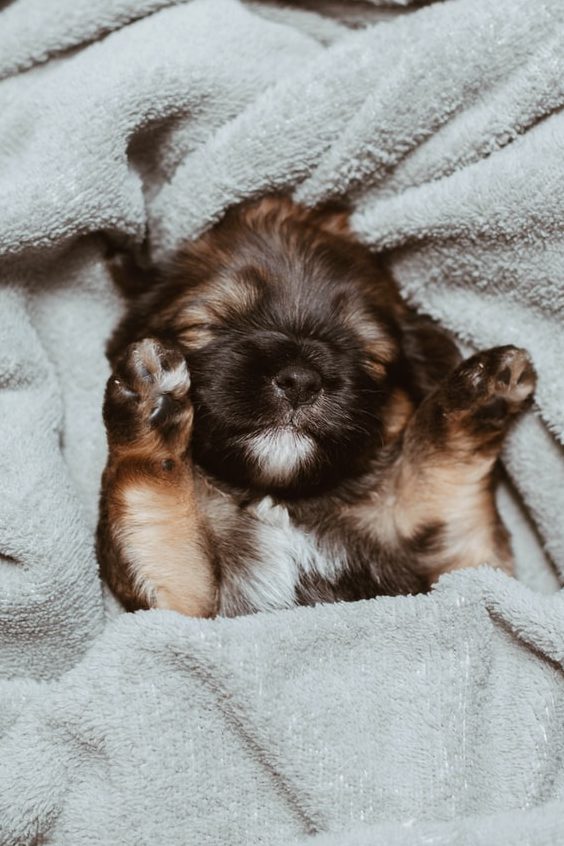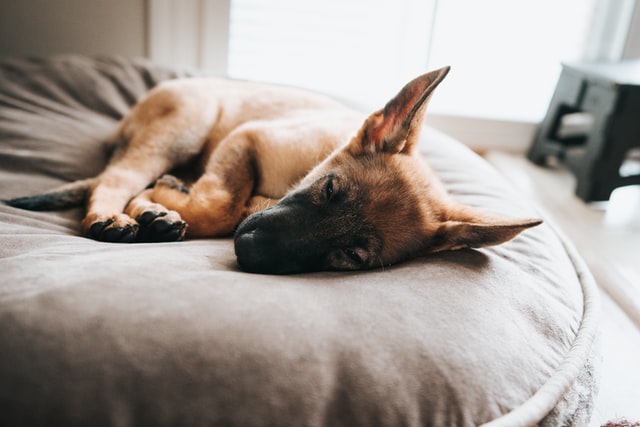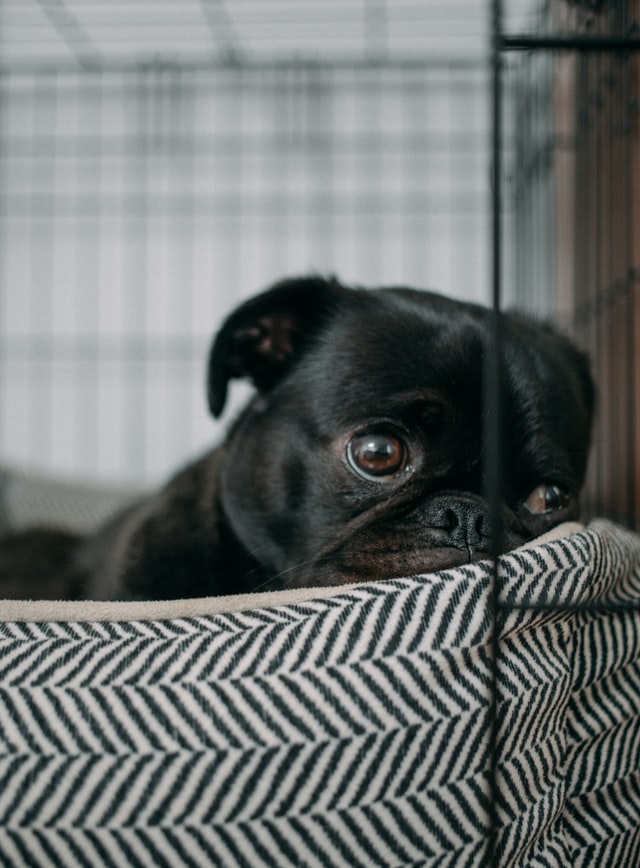You just brought home a new puppy? Congratulations! Puppies are magical creatures that bring joy and light into a home. They also are a lot of work. They will keep you busy all day and just when you’re ready to lie down and relax for the night, they start crying. As frustrating and heartbreaking as those cries can be, they are totally normal. Remember, puppies are babies!

Puppies crying at night are probably doing so for one of three reasons:
- They are scared or lonely. Puppies are used to sleeping next to their mom and their siblings. All of a sudden, they are on their own, in an unfamiliar place with unfamiliar smells. They need a little comfort and familiarity to feel safe and loved so that they can sleep peacefully.
- They need to go potty. Puppies can’t “hold it” for very long and they will likely need to be let outside to go to the bathroom during the night. Dogs are clean animals and they will try their best to avoid an accident in their bed.
- They are feeling sick. This is the least likely reason for crying at night, but if you follow all of our suggestions below and your puppy still is wailing all night, you might want to contact your vet to see if something else is wrong. Your puppy might be trying to tell you that they are uncomfortable or in pain.
Getting ready for bed

So how do you avoid all-night cries?
- This starts with a bedtime routine. Routines are really important for dogs, especially puppies. It helps them wind down from their day and prepare mentally for being left on their bed or in their crate for the night.
- Tire your puppy out! You want your pup to fall asleep as quickly and deeply as possible, which means they need to be physically and mentally exhausted. Play a game that involves a lot of running or activity, do a puzzle game to tire out their brains, and don’t let them nap before bedtime.
- Limit food and water before bed. Puppies have very small bladders so, chances are, they are going to wake you up at night to go out. By limiting their snacks and drinks before bed and taking them outside right before they go to sleep, you can extend the length of sleeping time before their first bathroom break.
- Location, location, location. Where your puppy sleeps at night is one of the most important factors that determine how distressed they are. Remember, they are used to being around their family. Put their crate or bed in your room with you so that they don’t feel scared and alone. After a few weeks, you can slowly move them out of your bedroom to wherever you would like them to sleep. Alternatively, if you don’t want them in your room, you can set up a bed in whatever room you want them to be in and have a sleepover for a few weeks until they are ready for you to go back to your own bedroom. This lowers their separation anxiety and also allows you to hear when they wake up and need to be let out!
- Make their bed a happy place! A puppy’s crate or bed should be a happy place for them. Leave plenty of blankets and toys around for them to snuggle with, try feeding them their meals in their crate or designated sleeping area, and give them lots of treats when they are hanging out there. This will make them less likely to cry to be let out of their crate at night.

Steps for when they cry
As much as you try to avoid it, crying is inevitable. So what do you do when you hear that late night whine?
- Take your puppy immediately outside in case they have to pee. Simply pick up your pup, carry them out to avoid accidents, set them down, and reward them once they go to the bathroom. Pro tip: leave your shoes, jacket, and a bag of treats by the door so you can get out quickly in the middle of the night.
- Put them back in their bed or crate. You want to reward the pee, not the crying. Bring your pup back inside and place them back in bed. Crying at night shouldn’t get them extra attention, otherwise we are reinforcing it.
- If you know your puppy doesn’t need to go out because they just went, let them snuffle at your fingers so they can catch your scent. Puppies are comforted by familiarity and family. They want to know you are still there. Comforting is not the same as giving attention. Keep your puppy in their bed, just let them know that you are there. Pro tip: include an old t-shirt or a well loved blanket as part of your puppy’s bedding so that they get to smell you all of the time.
- If your puppy is extremely distressed, especially in the first few nights where everything is unfamiliar and they haven’t created positive associations with their bed yet, take them out of their crate/bed. You don’t want that distress to work against you in the future. If they start associating their bed with negative emotions, you will have a lot harder time down the road. Comforting your puppy is not a bad thing. Remember, your puppy needs you! They are just a baby so a little comfort and cuddle at night won’t spoil them.
Don’t let your puppy “cry it out”
There is a school of thought that you should leave your puppy alone at night and they will tire themselves out and stop crying. We do not recommend this. Puppies are crying for a reason. If you leave them by themselves to “cry it out”, things might get worse.
- Your puppy will be loud. Puppies may be small, but they’ve got pipes. If you leave your puppy alone, they will cry and cry, keeping you awake, your puppy awake, and your neighbors awake. Everyone will be cranky.
- They might soil themselves. Your puppy might be crying because they need to go to the bathroom. If you ignore them, they will be forced to go in their bed. This isn’t good for your puppy’s health or well being and creates a huge mess for you to clean up later. Even if you think you know that your puppy doesn’t have to go outside, they might cry for so long that they have to go again and you won’t be able to tell because they will still be crying.
- They might develop separation anxiety. If your puppy is upset every time you leave them, they will never want you to go away. It is important to build up to being alone, slowly leaving your puppy for longer and longer periods rather than all at once. They should feel safe and secure being by themselves, not scared out of their minds.
- Your puppy needs you! Puppies are just little babies. They need comfort and love.
- Something could be really wrong. If your dog has a positive association with their sleeping area, crying can be a signal that something is wrong. Puppies can’t speak so we want them to be able to let us know when they need something. If we ignore them, their needs won’t be met.

How often a puppy needs to potty
Puppies have really small bladders and need to go to the bathroom a lot. Potty training can be a long and difficult process and every dog is different, but here are some general guidelines to help you along the way:
- Really young puppies less than 6 weeks old need to go every half hour.
- After six weeks, puppies can “hold it” an hour for every month of age.
- To avoid accidents, take your puppy out every 1-2 hours unless they are asleep.
Separation anxiety
Separation anxiety is a condition that occurs when your dog feels excessive distress when left alone. This can be because they don’t feel safe without you there or because they don’t trust that you’ll be back. It is extremely important that you create a secure attachment with your puppy so that they don’t experience separation anxiety into adulthood.
Separation anxiety can be caused by leaving your puppy alone when they are too young, creating negative associations with being away from you. It can also be caused by never leaving your puppy alone at all. So how do you know what the sweet spot for secure attachment is?
- When a puppy first gets to your home, they are already experiencing a separation. This is a time when you should be around your pup a lot, giving them lots of love and comfort during this difficult transition.
- After a few weeks, you should start to leave your puppy alone for short periods of time, starting with a few minutes and extending the time as they get used to it.
- Your puppy should learn to be alone for some length of time by the time they are 13 weeks old.
- Keep alone time shorter than 1 hour. An hour is a really long time for a puppy and any longer could cause distress.


Leave a Reply